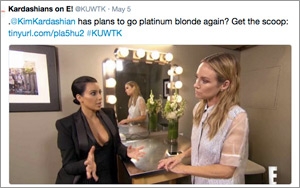Study: Social Media Drives TV Viewership
- by Gavin O'Malley @mp_gavin, May 6, 2015
 For years, Twitter and its rivals have been crowing about the power of social media to drive TV viewership.
For years, Twitter and its rivals have been crowing about the power of social media to drive TV viewership. Doubling down on these claims, new research from ShareThis shows a strong correlation between social engagement and higher tune-in rates. Users who click on shared content about a particular TV series are nearly two-and-a-half times more likely to become viewers, the social sharing service finds.
On average, 16% of viewers share about the shows they watch, but the percentages vary widely by genre. The social engagement rate among reality and variety show viewers is about 47%, while pure comedy shows only elicit an engagement rate of 9.5%.
New series inspire higher social engagement rates (about 25%, on average), compared to recurring series (about 13% on average).
Also of note, streaming shows like those found on Netflix see double the social engagement rate of broadcast shows (about 31% compared to about 15% on average).
The timing of social engagement appears to vary drastically by genre.
Most drama fans (34%) wait 24 hours until their shows end before yapping it up on Twitter, Facebook, and other social networks. Yet the vast majority of reality and variety show viewers (70%) do most of their social engaging during the show.
Timing of device and channel usage also appears to vary drastically.
For example, the use of tablets, smartphones, and Twitter spike during the broadcast of a show. Yet viewers’ preference for their desktops and Facebook increases with every hour following and preceding a show’s broadcast time.
For its research, ShareThis coupled its own data -- drawn from some 46 million users and 153 million TV social signals -- with Nielsen’s TV viewing data.



Or ia it really the power of TV content to drive social media?
All very interesting, but if you take an average telecast, how much of its viewing---in total-----is "driven" by social media? Are we talking 1%, 3%, 5%, 25% 50% or what? I suspect that the real percentage is on the low end of the scale----a few exceptions, notwithstanding. Why not analyze the data on a more specific, show by show, basis and provide a "norm" which can be tracked over time and compared to individual program performances, rather than the highly generalized "findings" in studies like these?
Agree wih the earlier commenters...there's a reason social chatter about dramas is 24 hours late. TiVo. Viewing is driving social activity, not the other way around. Word of mouth has always been the most powerful promotional tool a TV show can have. Social media may amplify that a bit, but cause-and-effect claims have yet to be borne out by media company reseasrchers. Search Mediapost for NBC's Alan Wurtzel and see what he said a year ago about Twitter driving viewersihp.
@Jim, As I recall, Alan said that "the numbers weren't there", or words to that effect.